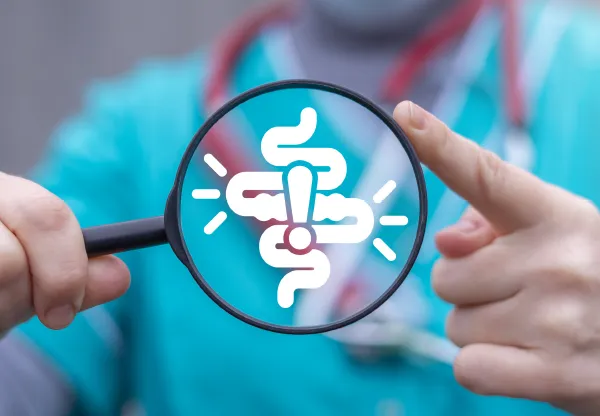We have expert nutritionists and functional medicine practitioners that specialise in getting to the root cause and supporting those with IBS naturally.
A Functional Medicine Approach to IBS
Functional Medicine assesses the individual, firstly reviewing diet, lifestyle, family history and genetic susceptibility and environmental influences. As nutritionists and functional medicine practitioners specialising in IBS, we also look at potential trigger events to give clues, this might be exposure to pathogenic bugs such as food poisoning, exposure to bugs while travelling abroad, antibiotic exposure, acute and chronic stress, past traumas, foods and more.

A structure often used in Functional Medicine to help with IBS is called the 5R approach.
This involves the following:
Remove
This involves removing things that are potentially driving the IBS type symptoms. This might include testing for and addressing certain infections, overgrowths, or imbalances. It may also mean following a targeted therapeutic diet, removing potential allergies, sensitivities, or intolerances to foods to help manage symptoms.
Replace
Here we look at what we might need to add back in. This could be foods that may have a therapeutic benefit, or it could mean adding back in acids, enzymes, nutrients etc that could aid overcoming IBS. By adding things back in that the body needs, this may help to reduce the risk of IBS flares and reoccurrences.
Repopulate
Ideally the bugs within us coexist in supporting our health. Unfortunately, when they get out of balance or become too dominant in unwanted areas this can lead to IBS symptoms.
Through testing we can establish what the imbalances are, where they are and what we can do to improve upon this.
Repopulating the gut with selected probiotics, prebiotics, postbiotics, fibres and phytonutrients can be very important to create long term improvements in your digestive health. Relying on the removal phase alone, will often lead to recurrence of the same or similar imbalances shortly after.
Repair
Unfortunately, a major cause and effect of imbalances in the digestive system is the breakdown of our intestinal lining, also known as leaky gut or intestinal permeability.
Our digestive lining is like a bouncer on the nightclub door, allowing good things in, kicking bad things out and stopping bad things to get in. When this breaks down and things get into the body that should not this can trigger off systemic immune and inflammatory response that affect the whole body.
If we see evidence of impaired intestinal barrier function, we look to treat the underlying reason for this and provide nutrients and compounds that assist in it’s recovery. Underlying causes can be infections, food sensitivities and overgrowths, however other common causes include nutrient insufficiencies and stress.
Rebalance
Rebalancing involves optimising nutrition, sleep, stress, movement etc for the long term to help support the changes we are making but also to help prevent recurrences of IBS issues in the future.
Not only is our physiology complex, how we interact with our environment and how that influences our physiology is also very complex. There is no one size fits all approach to IBS, therefore, we work with you to find what is going to work for you. Part of this is looking more broadly at your health, nutrition, and lifestyle to make improvements across the board, providing more balance and a better foundation to work from moving forward.
Looking for support to help overcome IBS naturally?
How the Functional Medicine Approach helped Steve overcome IBS
Around 2008-2010, Steve was suffering with ongoing digestive symptoms, severe fatigue and brain fog, erratic mood, reducing libido, frequent colds etc. These symptoms had been ongoing for at least 2 years, progressively getting worse.
Investigations carried out by his GP at that time, provided no evidence of imbalances. This led to frustration on Steve’s particularly when the Doctor implied the symptoms must be ‘in his head’.
Around this time, Steve went to see a lecture on the Functional Medicine approach at the Royal Society of Medicine. Being inspired by that lecture and determined to find out what was causing his issues, Steve went on to work with that practitioner over the subsequent 6 months.
During that time, Steve discovered he had 2 chronic infections in his bowel, resulting in a deterioration of certain hormones in his body as well.
Addressing these infections as well as making other nutrition and lifestyle improvements meant that Steve was able to fully overcome the digestive symptoms and importantly other systemic symptoms as well.
It was this experience that led Steve down the path of studying Functional Medicine and adding this to his clinical practice. He went on to be mentored by that practitioner for 2 years before studying with some of the best Functional Medicine institutes and practitioners. He became one of the earliest adopters of Functional Medicine in the UK and has since built his team with other IBS specialists as well using our own blend of nutrition, lifestyle, and functional medicine.
IBS symptoms and conditions that we support:
Small Intestine Bacterial Overgrowth (SIBO)
Bloating, distension, and excessive gas/belching
GERD, reflux, and heartburn
Irregular & unpredictable bowel habits
Abdominal pain and cramping
Microbiome imbalances and infections
Food allergies, sensitivities, and intolerances
Impaired digestion and absorption
Intestinal Permeability
Let us help you get to the root cause and manage IBS naturally
Learn More About What Our Clients Have to Say
Lauren
I had a bout of food poisoning when I was abroad and suffered from what I thought was IBS/Food intolerances for the last 22 years after that. I had been through my doctor/hospital/my own reading and diagnosing to no avail, enough was enough as I got to the point where...
Lauren
I had a bout of food poisoning when I was abroad and suffered from what I thought was IBS/Food intolerances for the last 22 years after that. I had been through my doctor/hospital/my own reading and diagnosing to no avail, enough was enough as I got to the point where I was ill 4 days out of every week making my life pretty unbearable and unable to do much.
My husband and family agreed I could no longer go on like this and the internet search began for help. Came across Steve Grant Health’s brilliant website and loved that explanations were given to explain their way of working and experience and the holistic approach really appealed to me. As soon as I contacted Fay, I knew I had done the right thing. I was then put in touch with Ben who is amazing, so knowledgable, understanding and completely knows his stuff and puts you at ease. To cut a long story short I’ve just had the first 4 weeks of the last 22 years with no issues/symptoms at all!! I still can’t believe it and long may it continue. Ben assessed my situation, I had tests and began on the recommended supplements that were adjusted after the first month and gave me this outcome.
Don’t suffer any longer people, this is such an easy process with people who genuinely care and understand. The whole process is so simple and being able to chat/update and keep in touch throughout the month is brilliant. I highly recommend and I am only at the start of my life changing journey.

Sarada
Now, after having worked with Jane, I have all the tools necessary to continue managing my condition (PCOS) powerfully. I have a much better understanding of how my body works, and how to deal with any issues that may arise.
Before I came to work with Jane at Steve Grant Health,...

Sarada
Now, after having worked with Jane, I have all the tools necessary to continue managing my condition (PCOS) powerfully. I have a much better understanding of how my body works, and how to deal with any issues that may arise.
Before I came to work with Jane at Steve Grant Health, I had really been struggling to manage my PCOS symptoms. It felt like I was constantly experimenting and never quite finding the right solution.
After reading about what Jane offered, I felt that she would be a great fit for me and what I’ve been dealing with, and I was pleased to discover that I was right!
What I valued most about Jane’s approach was that she listened and was thorough in learning all about my condition, and anything else that was going on for me. She provided me with a comprehensive program of nutrition, movement and supplementation, and as I continued working with her, I could see that some of the more difficult aspects of my condition began to subside. And even when I had an unexpected injury, that could have derailed my progress, Jane was always there to provide much needed support and advice.
Now, after having worked with Jane, I have all the tools necessary to continue managing my condition powerfully. I have a much better understanding of how my body works, and how to deal with any issues that may arise.
Thank you so much for making such a difference to my health and wellbeing!

Conor
Steve’s knowledge and advice has been invaluable in helping with my digestive issues. His approach is pragmatic and clear, and doesn’t leave you following advice without understanding why.
One of the things I’ve found to be great with Steve, is that it has never been ‘do it like this or it...

Conor
Steve’s knowledge and advice has been invaluable in helping with my digestive issues. His approach is pragmatic and clear, and doesn’t leave you following advice without understanding why.
One of the things I’ve found to be great with Steve, is that it has never been ‘do it like this or it won’t work’. I always felt that he was flexible and ready to work with any limitations you might have, in order to still reach your goals.
I’ve been truly pleased with the whole process and would happily recommend Steve and Fay to anyone!

Kathleen
Steve – I’m really happy with the progress I’ve made since seeing Steve. I don’t have bloating anymore, my skin has cleared up, my energy levels are a lot higher and I’m not snacking anymore. He’s taught me how to balance meals so I’m getting the most benefit from my...

Kathleen
Steve – I’m really happy with the progress I’ve made since seeing Steve. I don’t have bloating anymore, my skin has cleared up, my energy levels are a lot higher and I’m not snacking anymore. He’s taught me how to balance meals so I’m getting the most benefit from my meals. Everything has been explained clearly, taken at my pace and the reports you get after each consultation are so helpful. I’ve really felt like no problem is too big/small and I couldn’t be happier. I wish I’d contacted you sooner!
Fay – Thank you for your quick responses to all my initial queries. It makes a big difference who you first speak to and you’ve always had a nice and friendly manner. Thank you for always reminding me of appointments because it’s so easy to forget! I know if I ever had a query, you’d help me straight away.

Stay in touch
Subscribe to our newsletter and receive your FREE seasonal recipe ebook





